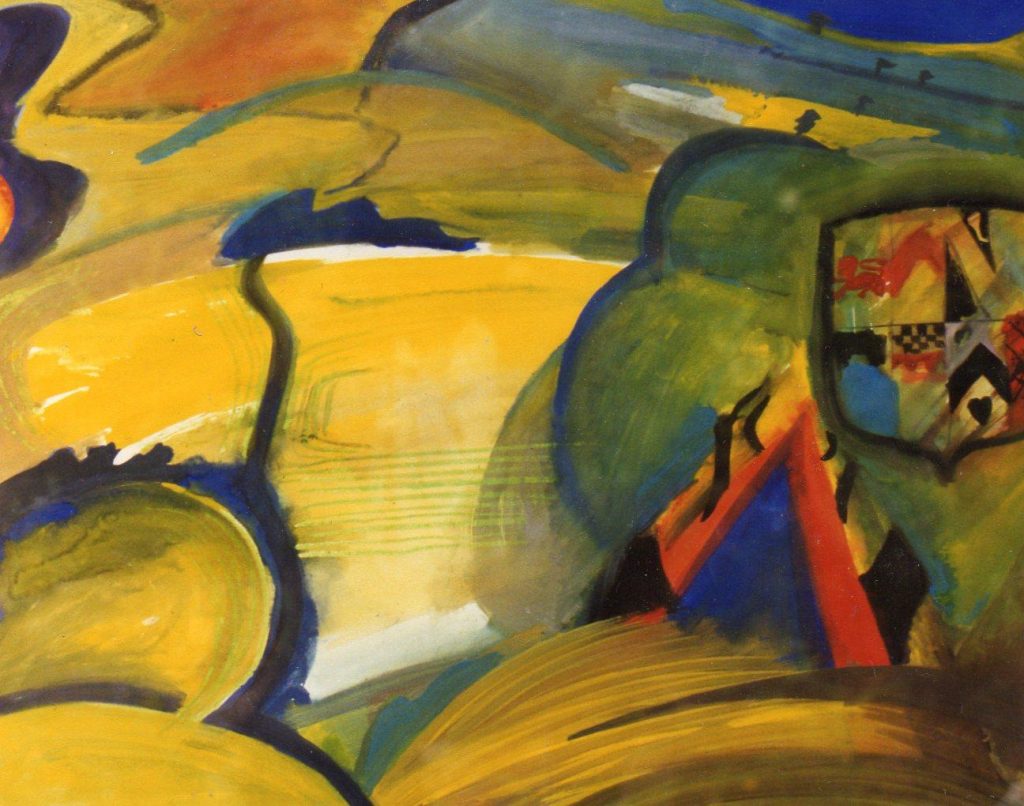
“You have to believe in words and the images they might summon: a form that requires no budget or collaboration – no expensive or troublesome distribution. Even if no-one much cares for complexity anymore. Even if no one cares at all. Even if depth is like silent film or typewriters – terminally out of fashion.” So, an imaginary voice whispered from a non-existent car radio on our recent, miniature, English Journey. During its course we passed through at least ten English counties – most of which, motorways can’t help but make irrelevant, only compensating now and then with the idealism inherent in certain flying bridges and optimistic structures such as the ex Forton services Tower[i].
The true age of the car ended in about 1975. Since then all the damage has been for nothing. If there is any silver lining with climate change, it will be the death of the characterless car, the soulless coffin powered by combustion-engine. If we’re lucky, the motorways will be for bland electric and legendary classic vehicles only. If not, they’ll soon be overgrown.
The faint parallel between our English Journey and J.B.Priestly’s rambling epic of 1933, no doubt became exaggerated in my mind thanks to a misty, cold trip the week before which had brought us in half-fog to Priestly’s “favourite pub”: The George Inn at Hubberholme. Since his ashes rest in the churchyard nearby, and the pub is still pretty much as pubs enshrined in memory remain, I’m inclined to believe the claim, even though what he writes about that Dales hamlet – “one of the smallest and most pleasant places in the world” – is not exactly memorable. Perhaps he didn’t want to encourage further tourism?
As the bold sign: “Priestly’s favourite pub”, was nowhere to be seen, my good companion began to doubt me. Could Priestly still encourage trade? Who remembered the Bradford-born sage? I was fantasising again, she suggested. I’d dreamed the idea from some weird fusing inside my head: on one of the numerous occasions we’d passed the pub before, I must of been thinking of Let the People Sing, An Inspector Calls or The Foreman Went to France?[ii]
Ordering our drinks, I blurted out my burning question to the genial Landlord. Luckily, he confirmed my darkling recollection. The clouds cleared. My mind became whole again. “There’s a sign on the road in Buckden,” he added, before drawing our attention to a small portrait by the door, of Priestly with information. But just arriving as he spoke, customers were aiming for the table underneath. Thinking fast, my companion snapped a photo with our cheap childproof camera. Rather than breathe down the necks of windswept walkers soon to be relievedly enjoying a hard-earned lunch, we’d be able to decipher the words later. Or so she hoped. But it was not to be: the location was dark; the writing by the photograph, indistinct. Instead, we had to be content with this evocative depiction of Priestley’s favourite pub – its outside prospect, hanging inside:
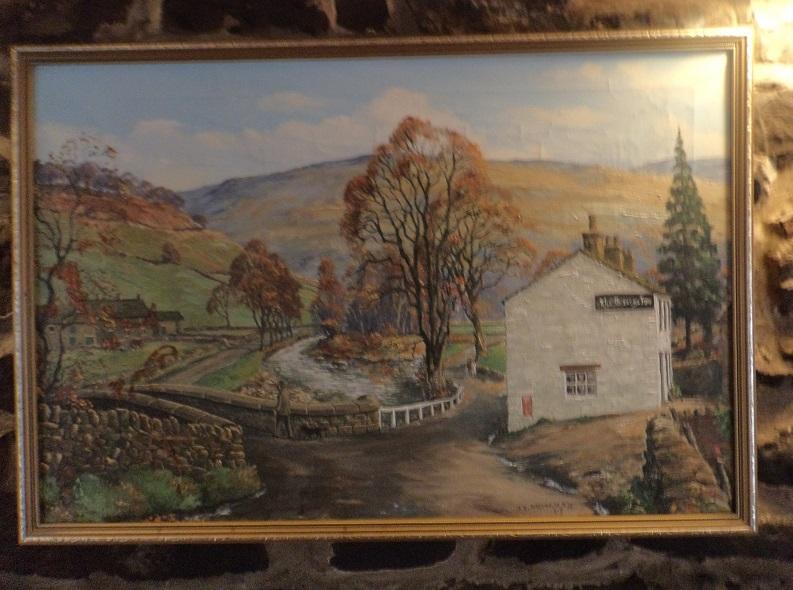
Priestley’s favourite pub
Somehow, it’s not hard to see Priestly ambling down this lane to pause upon the curving bridge, puffing upon a pipe whilst pondering the fells. Perhaps as the water sparkled beneath, a flock would approach, allowing him to offer lucid tutelage to their guiding shepherd . . .
Originally at this point there followed a long section on Priestley’s pros[iii] and one serious con[iv]. But my fondness for Priestly didn’t stem from his novels, nor from English Journey or Literature and Western Man[v], nor even from his wartime projects and the idealism which preceded and spun out from films such as We Live in Two Worlds[vi] and They Came to a City[vii]. In fact, the more I read concerning Priestly – to check vague notions and memories – the more various and diffuse my view of him became. How easy it is to have an impression of a person or event that is either wrong or totally inadequate. How easily history can be twisted or overlooked, revised or corrupted. Where in all this does the truth lie?
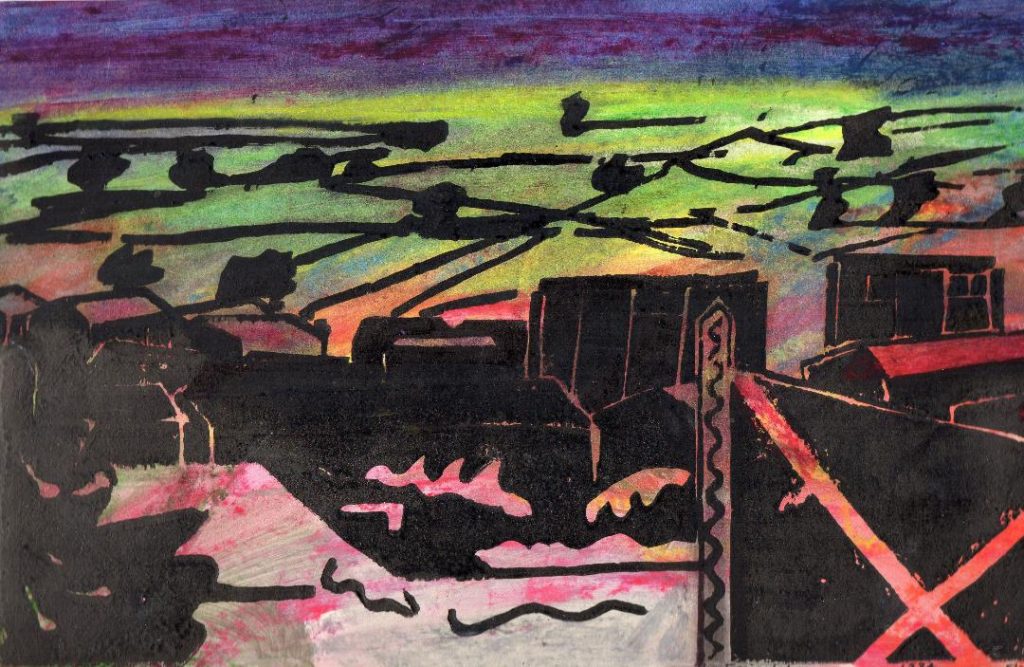
‘Estate Extent’ Linoprint 1984 (Elmhurst estate from the Tindal demolition site).
Though I remain ambivalent about the casually linked coils of music which are apt to proceed from some whimsical choice made on the internet, they can effortlessly veil the domestic background. Recently, sailing randomly into a liquid piano piece by Debussy – one my mother was once fond of – I was suddenly back in the kitchen of our house on Elmhurst Estate[viii] more than 40 years ago. Distracted, I ended up reading the following chain of comments:
“I fell in love with these pieces 20 years ago. Now I am a concert pianist.”
“I heard these pieces when I was 1 month old. Now I’m a piano.”
“I heard these pieces when I was 10 minutes old. Now I’m a transient sound wave.”
“I heard these pieces one hour ago. No change, yet.”
“I heard these pieces before the big bang which is why I created the universe, so Debussy would put pen to paper.”
“But the man was a racist!”
“If you always look at their history, you shouldn’t listen to classical era stuff. Like it or not, most people were racist then.”
“Everyone was racist back then.”
This made me wonder how we will be viewed in 100 years, assuming there’s anyone left to do the viewing:
“They all drove around in polluting vehicles then. At the slightest excuse. No one gave a thought for tomorrow. No one thought of us. They were all bastards.”
“But everyone did it then.”
With Priestly, whose puffing pipe’s pollution would nowadays brand him pariah, I was anxious to preserve the personality I’ve always had in mind – to have it backed up. I didn’t want my myth obscured by any final truth. For as well as arising from the tone of lighter propaganda films, such as The Foreman went to France (1942), my deep affection for the man stems from his chance resemblance, in one photo, naturally puffing on a pipe, to my mother’s father, Fred Gee – despite that ever-talking Fred, too busy lighting a fag from the stub of the last, never used a pipe. The greatest suspense my mother ever experienced in her life, she often said, was not the cable-car sequence in Where Eagles Dare (1968) [ix]. It was being aware of those sagging fuses of ash. She couldn’t concentrate on anything he said, only the fag oscillating in his mouth. At what exact moment would the ash depart? Would it be harmless, or would it melt the new nylon carpet? No doubt Fred awoke like the character in All That Mighty Heart[x] with a fag and a good cough.
Because of the faint resemblance between my Granddad and Priestly, each have absorbed some of the other’s qualities – if I can use that word in a neutral sense. According to Graham Greene, Priestly “became in the months after Dunkirk, a leader second only in importance to Mr. Churchill. And he gave us what our other leaders have always failed to give us – an ideology.”[xi] All this the younger writer could say despite Priestly’s threat of legal action in 1932 over an assumed derogatory portrait in Stamboul Train.
No one could ever accuse my Grandad of having an ideology – “An IDEO-WHAT-O-GEE?” he would have scoffed humorously – or even of much interest in the wider world. Yet still, due to his underlyingly generous nature, to his air of personal certainty, I gifted him with some of Priestly’s best qualities – as if in all his years driving lorries he must have been thinking hard, puzzling through the smoke of his fags, the route to a philosophy.
It’s rare nowadays to see lorries with canvas flaps at the back. In the early part of the war, before being deployed in North Africa, Fred taught others to drive army versions; and well afterwards, driving for B.E.A.[xii] – out from London Airport to deliver freight to the capital – many lorries still had canvas flaps at the backs. Once or twice my cousin and I went with him and this remains a vivid memory: of looking out through the flaps onto Ealing Broadway. Where had he got to then in the late 60’s, with his philosophy?
Truthfully, apart from a certain down to earth quality and that they both died in the same decade, Fred had nothing in common with Priestly. Fred was a working-class capitalist at heart, buying a house and being the first in his street to own a car. He drove from the 30’s to the 70’s, all through the desert campaign and up through Sicily. He always claimed he could drive no matter how drunk he was. “Lift me into me seat chums,” he supposedly slurred after his diminished platoon, drunk on liberated wine from an abandoned cellar somewhere in Italy, were attacked by a strafing Messerschmitt. Of course, this story may have been embellished, as without doubt was his salt-of-the-earth advisory capacity to “Monty”[xiii] – repeated most Christmas times as though the two of them were regular drinking pals from El Alamein on. With all his international and national travelling, surely Fred had at least the basis for a study of truck stops: Transport Cafés and Western Man?
Later, when retired, he worked in a gardening centre by day and as watchman by night. Presumably what he watched wasn’t that valuable, since he installed a camp-bed and was immensely pleased at being paid to sleep. “I get cash for kipping Lol!” he exclaimed, advising me to adopt a similar career. In the liminal hours between gardening and sleeping, why couldn’t he come up with his own theory of time? Sleep and Time, perhaps? After all, stick a pin in your eyes, every theory of time ever evolved is hogwash. They all depend upon the subjective senses[xiv]. Fred Gee had as good a line in hogwash as the next human and liked to pretend that his only ideology was I’m Alright Jack. In reality, he would inevitably have extended his ladder. His racism was less than skin deep. As soon as he talked and easily took a fancy to anyone, he couldn’t care less about their colour or creed.
By coincidence, my other grandfather was also a lorry driver – and through the same designated time period as Fred. Of East German descent via Brazil, he worked a passage to England in the early 30’s but due to the Freiesleben name, was only trusted as night-time firewatcher during the war. I wonder if he caught any of Priestly’s early wartime broadcasts in 1940 or 1941? Considerably taller than Fred, Harold or Bob as he became known, bore – in several photographs anyway – a striking resemblance to the older Robert Mitchum[xv], but that’s another story . . . a digression too far.
Having passed Birmingham, survived all sections of smart motorway, and seen no trace of lorries with canvas flaps, we stopped very briefly at Strensham services to stretch our legs and breathe the diesel-laden Worcestershire air. The Malverns in the distance are always uplifting, the sounds of Elgar or the poetic visualisations of Ken Russell filled my mind. I’m only sorry to report that I never had any relatives who resembled either Sir Edward or flamboyant Ken. Once, on a long night drive however, my daughter and I explored Great Malvern at evening, embracing the metal Elgar where he stands with a great view down Church Street. While several years earlier, on a five-day cycle, my eldest son and I, had a bowl of cereal at sunrise in the same cheering spot after camping out on the northern slopes of the Worcestershire Beacon.
Speeding north around Bristol and arching over Avonmouth docks, we climbed the ridge of Tickenham Hill, where the M5 divides its carriageways and gives a fine view on a clear day of both the epic bridges to Wales. Like the Lune Gorge, this is a rare bit of motorway that can’t override the scenery.
Passing Taunton and the Blackdowns, whose northern end is skewered by Wellington’s three-sided obelisk[xvi], we reached Devonshire at last – the county which perhaps to me will always seem my soul’s true home – if I can be forgiven such intimations from the mystical end of the hogwash spectrum?
For thirteen years Tiverton was one of our distant, local towns, and the extension of housing around it gave us a mild surprise. Further west, the friends with whom we stayed were as calm as ever. In the comfortable kitchen of their rambling house, it was as though nothing would ever change.
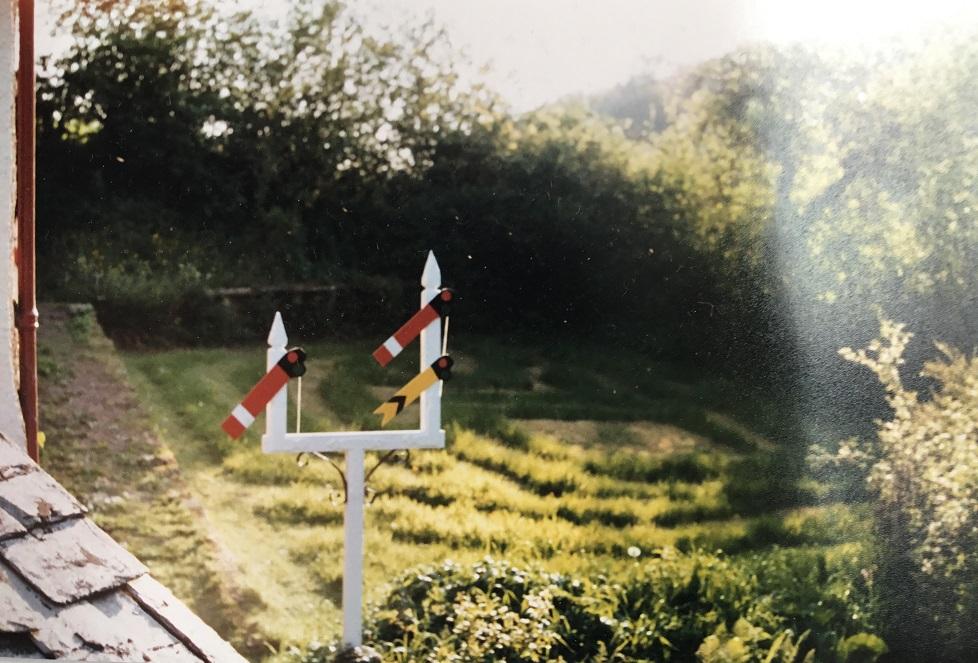
Next morning, I set off alone to deliver paintings across the Cornish border, diverting to see the old house, where two of our children were born upstairs[xvii] and where all of them grew up. After we left, nearly ten years ago, the place was refurbished by the estate, its old asbestos roof stripped off and windows exchanged for UPVC. At first, we could not bear to pass that way. All the atmosphere had been destroyed. No longer an Ultima Thule in paradise, it was just a house under a bend in the lane. But with the help of time and nature, it is fighting back. The roof looks weathered now and the garden is gaining in exuberance. Its trauma is in the past.
With snow on the heights of Dartmoor, I was struck by how challengingly strange, the once so familiar had become ten years on. Beyond Zeal Monachorum, I was back into magic land. Rain was coming, yet there was sun for now.
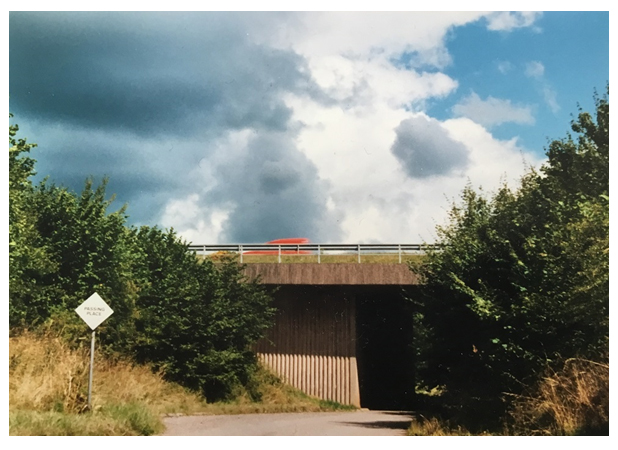
Thunderous sky, but sun for now (North Devon Link Road near Lurley, August 2001)
These days – as with Priestly resting at Hubberholme – we almost live upon carboniferous limestone, which gives a landscape better than anywhere but Dartmoor and the granite outcrops of Cornwall. Yet there is some subtle, unknown openness about this lost middle of Devonshire, this undulating westernmost outpost of the Devon redlands[xviii]. Steadily I am absorbed by its pantheism – as if the whole region were the cupping surface of some immanent metaphorical Grail! Between Spire’s Cross, until bridging the river Okement, I feel as if I am the land around. At Jacobstowe, enhanced by the indigo cloud streaming in from the coast, the eastern face of the church is radiant in early sun. The B road bends on into the huge twisty trees of fairy tales, of Snow White and Rose Red and the lurking bear of majesty – replaced in my mind by some ideal of Wat Tyler[xix] or Robin Hood who wouldn’t bend their knee to any king. These trees, implying forest, persist to Basset’s Cross, in thrall to nothing but the spirit of the land itself.
Past Highampton begins the bleaker mystery of the wilder plateau heading for the rocky Atlantic coast. Through the regimented plantations of Brandis Corner, all this area recalls evocative journeys past. Ever since the village of Bow, for the 30 slow-motion miles to beyond Holsworthy, I’ve felt to be moving across the surface of a myth.
Pausing at Clawton I try to make notes, to catch my breath, to fathom the transiently profound depths and meanings that occur so unexpectedly on certain journeys. But they slip through my mental grasp. Chewing on a couple of wine gums left in the glovebox, normality resumes.
The eternal wonder of Launceston seen from the north, with the castle high on its Arthurian mound returns me briefly to the myth and other cycles of the past. But crossing the Tamar, the town itself is packed – a scaffolding truck blocking streets built for horse and carts.
My time in Cornwall, staying the night at the Terre Verte gallery (http://richeart.co.uk/) with friends Richard and Cathy, would make another digression in itself: The walk on the Moor, the conversations about half of everything under the sun – not least the powers of landscape; the potential of Extinction Rebellion; the influence of Richard Jefferies and Paul Nash; the history of folksong in the west of Ireland . . .
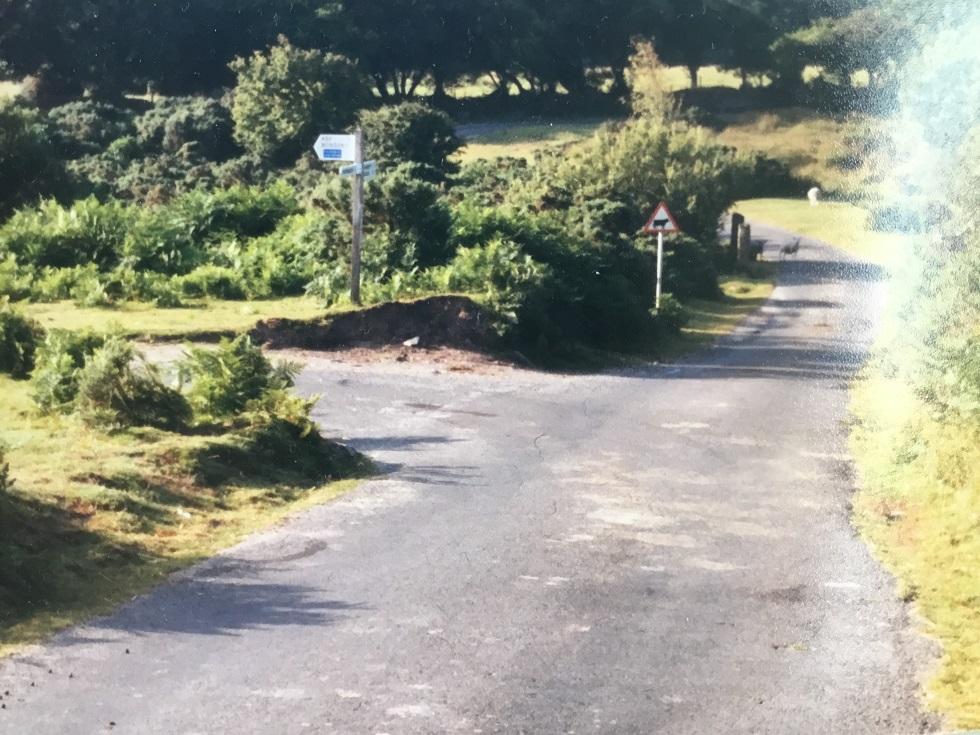
Throwleigh Common, July 1999
Without the early sun to gild the following morning, the return journey to Devon became melancholic. There was the threat of memory lane and down the drain – always a hazard if you respect time literally, rationalistically. You must remain clear of such bad habits; you must remain ecstatic! Taking the old road down into Okehampton, I was thrown back 30 years to the time when my life began again, my second chance to get it right, though who ever can? I could feel all the time gone – but what can you say to counteract this feeling that works for anyone but yourself? My mind so frequently breaks loose of its forged manacles, that I know I’m either weird or borderline mad. It’s rarely hard for me to embrace that grail-light most would consider delusional – in which the black hole of chronological time and space is miniaturised and disappears. Yet all this transcendence starts in the specific. Perhaps for me it starts in or before that old chronology, those ten years when our family was still young: in Belstone and Throwleigh – within the spell of the Moor.
Leaving Okehampton my time-travelling silver spaceship drifts past rafts of new-build houses. Half the houses built since the 70’s, can fascinate me. The suburban girlfriend under the roof – an atmosphere I can never fully grasp – one which can colonise or expand from films and stories set thousands of miles away, or at different times in countries I’ll never see.
This essence, this unknown person under the roof, combines something of all those I knew in passing, as well as something of those known now. Yet it could not and can never be anyone in particular – for that would only displace, an essence greater than all particulars. Which does not stop us trying to find this person or that time or place. The search is in our nature. But if you can relax, the essence behind the unsatisfied desire can expand to include you – for it dwells in the potential that no-one can ever humanly reach – an internal/external paradise: a perfection beyond all those transient imperfections which spark the love towards it. If this sounds suspiciously religious then perhaps it must, for there are no other words into which to put the experience. Only a few paintings, poems or films, the odd piece of music, occasionally suggest or contain it – and these are rarely the same for different people with different specifics.
The silver machine shifts on, and everything tells me that this vague feeling emanating from windows under roofs, is about the ideal of love, personal and impersonal. This is why it remains so elusive: As soon as any actual person emerges from the flow of memory or imagination, their personality, no matter how ideal, is bound to be overwhelmed by the world of chronological time and space. Projected through the chronology of our limited world, the elusive feeling must give way – the sense of potential, the out-of-time-ness, cannot survive. This is why the characters in my novels and stories, particularly perhaps the women – since I am limited, just as all our theories and sciences must be, by the senses and desires of my human condition – are so fascinating to write: Their fictionality, their ethereality, keeps them timeless despite what nightmares they must face.
That afternoon, I had a long rainy walk through the landscapes of yesterday and entering one small church, found that the visitors book went back 30 years and in it were various entries made on cycles with the children at different ages and later by the children alone. We always liked churches and churchyards, not for any religious or transcendent reasons, but perhaps ironically, for their sense of grounded history, their specific, provincial, stone-binding into the social-geographical landscape, their earthbound gravitas. Only a few obviously transcendent natural things, or exceptional works of art, can more ably ignite a feeling of the timeless in me. Their very ivy-clad, timeworn, graveyard solidity is there to suggest its opposite – you just have to get past the surface.
Churchyards are often a sanctuary too: the best place to seek shade if it’s hot, or in rain when you need a porch or a lych-gate. Therefore, I respect the more traditional peace people may find in such places. Mine is just a more extreme form. Delusional if you like. To me a churchyard is the perfect place for a picnic, so long as you leave it as you find it.
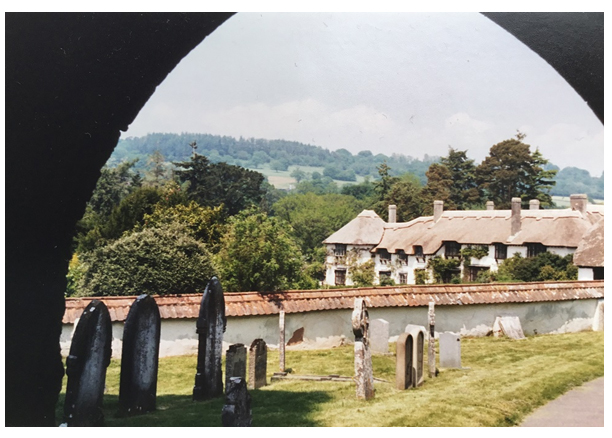
‘Hollywoodhembury’ (actually Broadhembury, revisited 30th May 2003)
Motorway miles often lead to a kind of numbness – not quite as pointless or fast as taking a plane, but definitely a gormless thing, which like flying, we must to learn to live without. I tried to imbue the wide gouge through the Lickey Hills south of Birmingham with images of steam trains climbing the steepest mainline gradient in the U.K.[xx] throwing their unfortunately glorious, volcanic eruptions of carbon and steam into the air and over the landscape.
Our destination was the town of Loughborough, and though it was still the first week in April, it was freakishly hot enough to sit and eat lunch in the back garden of the ex-council house shared by my sons there. As they still had a problem with the excess abandoned furniture of previous tenants, the garden was host to the wardrobes and settees of various eras – into whose stories and origins it would have been easy to drift if our time hadn’t been so limited.
The Travelodge at Chaddesden, two and a half miles east of Derby, into which city the village was incorporated in 1968, was unexpectedly familiar. It transpired we’d stayed there one autumn before, filling our vehicle with apples no-one seemed to care about, from the trees overhanging the overflow car park.
As I can rarely sleep before midnight, I set off to find out how busy Derby was on a Saturday night. By now it was dark and leaving the Tudor-revival of west Chaddesden behind, at first the road rises to bisect the dark Victorian atmosphere of the Nottingham Road Cemetery, with its imposing entrance gates and lodges. Both Franju[xxi] and Dracula would have enjoyed a twilit flit around these extensive grounds – being locked and firmly secured by a private security man as I passed. Back in 2015, twenty-four graves here were spay-painted with swastikas and other slogans[xxii] during the night preceding Armistice Day – a futile gesture by the sort of minority we all hope has ceased to exist.
Falling between high stone walls and a canyon of terraced houses with steep gardens, echoing with the roar of half-filled night buses, the Nottingham Road eventually levels out. Here, the usual purgatory of fragmented buildings, domestic and industrial, is fascinating to the wanderer but probably dreary to those inside. How long was it, I wondered since anyone concerned about jogging around the city, took refuge in the Pentagon Gym? And what industry did the building serve before gyms were fashionable? I tried to find out but failed.
At a large roundabout where all the traffic diverged, the pedestrian route continued straight on, diving beneath the railway towards another low bridge guarded by a structure dangling a series of chains over the road – the clank of which must be preferable to decapitation.
Beyond here and over the river Derwent, under the coloured lights and amongst the partying crowds, my exploration flowered into a myriad of petals, each one a conflicting impression. Ruined areas like bombsites. Condemned blocks built in the 60’s with a different sense of hope, or loss – depending on your age, your point of view. On the corner of Macklin Street, a derelict cinema, disappeared into the night, with buddleia growing from its awnings and a faded pattern of harlequin triangles. Dedicated cinema-goers always, did my father with his mum, briefly evacuated to Derby in 1940 (only to come back for the worst of the Blitz), once queue here?
I was searching for a pub with an outdoors – one where I could have a drink, have a flat sandwich from my pocket unnoticed and scribble these notes. Eventually, I found one with a yard and plastic vines, convincing by luminous light. Over high locked gates to the road, buses surged by, only the top deck visible, steamed with condensation, isolated heads inside.
On the pub T.V. some medical drama was playing. It looked like the kind of thing that used to be on 30 years ago. Surely it can’t still be running? It wasn’t interesting then and it certainly isn’t now. Does popular necessarily mean worthless? Inaudible above the pulse of speakers pumping out cover versions of songs superfluous in the first place (“Another one bites the dust! Another one bites the dust!” endlessly chants a voice), the pub T.V. was massive and no-one was watching. Nor did anyone care about another one biting the dust[xxiii], despite the insisted emphasis of that histrionic chorus – stuttering and drumming itself into a laughable burlesque of gangster carnival revenge. All these strands of disconnection: the grinning faces laughing without hearing, shouting above the phones and sirens, eventually, with the cacophony and the plastic ivy, reduces me to a crazed bemusement, sliding towards hysteria.
On I wandered thro’ each charter’d street[xxiv] / Amongst knots of people and surging flow. Few marks showed in any face / Not of weakness nor of woe. / Outside every club, the desperate throng, / Dancing and dropping, forced the good times on / Consume we must, consume we will / Into the nihilism this doth entail. / Though life is sweet we think at times / we mostly remain its victims . . . as this aimless game persists – a crazy, wacky race[xxv].
The pedestrianised central streets opening from Iron Gate were the middle ground: these people at least had money to burn or believed they had. A vomiting girl supported by two friends, would soon be ready for the next round – or so her friends assured her. How much does the delusion of social interaction on Friday and Saturday nights support the wider illusion of time and space?
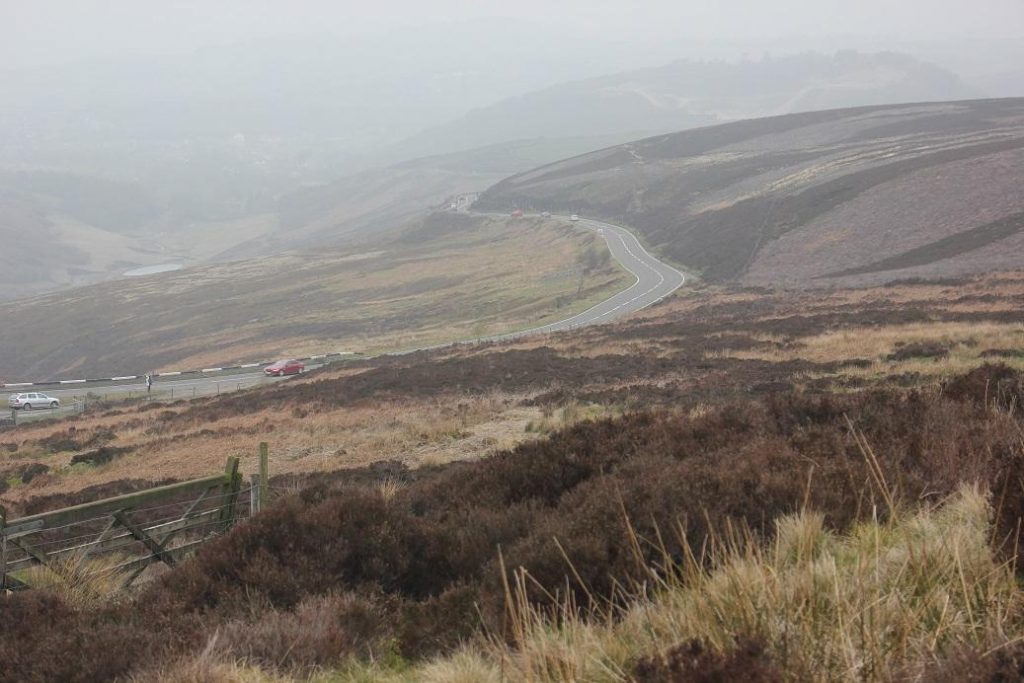
The far side of Snake Pass, Derbyshire. 7th April 2019
After Derby, sick and tired of motorways – sick in fact of straight roads entirely – we set off for home through the Peak District by way of Snake Pass, descending to Manchester, then Bolton, Preston and Lancaster.
But what summed up more than anything else, the increasing social political situation around the world on our concise English Journey, was not those aimless partying night-lifers in-between, it was the extremes: The busy soup kitchen after I crossed the Derwent into the centre of the city. There must have been 100 people or more, queuing in Full Street (that really is its name), waiting for something to eat, while less than 100 yards away, full in sight, up the narrow lane of Amen Alley, a bow-tie event, by invitation only, was filling the richly illuminated interior of Derby Cathedral.
“You have to believe in words and the feelings they might summon. Even if no one much cares anymore. Even if there’s no time left. Even if life is terminally out of fashion,” finished the voice. I switched the radio off.
Lawrence Freiesleben May 2019
———————————————————————————
Title painting: ‘Summer Toward the Blackdowns’
Gouache & Oil Pastel 57 x 71 cm 1988 (based on the area around the Drewe Arms in Broadhembury).
Footnotes:
[i] Now renamed Lancaster services. The high hexagonal restaurant at Forton servies, https://fortonservices.webs.com/ eventually closed in 1989 due to new fire regulations, but was thankfully listed in 2012: https://www.theguardian.com/money/2012/nov/27/lancaster-services-m6-listed-status
[ii] Film adaptations of Priestly’s work : Let the People Sing (1942), The Foreman Went to France (1942) and An Inspector Calls (1954 – plus numerous adaptations since).
[iii] English Journey (1934) not only inspired Orwell’s Road to Wigan Pier, but along with his wartime radio broadcasts (attracting audiences of up to 16 million, yet eventually cancelled by Churchill’s cabinet for being too aggressive towards the government) has also been claimed as a major factor in Labour’s 1945 landslide victory. See https://en.wikipedia.org/wiki/J._B._Priestley
In 1942 Priestly was a co-founder of the socialist Common Wealth Party and in 1958, a founder member of CND.
[iv] His uncharacteristic, seemingly random racism towards the Irish. Perhaps on one unmentioned occasion visiting Liverpool for English Journey, he had a violent altercation with somebody Irish for which he then blamed the whole race? Or perhaps he’d had one too many in The George Inn?
[v] Described in an Amazon.com review by ‘Backpacker Bill’, as “Good leisurely reading” and “iconoclastic with regard to the academic world.”
[vii] The film version of They Came to a City (1944?) bookended by Priestly appearing himself to talk to camera, may be wooden and static, the city that we never see, a kind of welfare state Lost Horizon (I’m thinking more of Frank Capra’s 1937 film adaptation of James Hilton’s 1933 novel), but their always remains a genuine hope and intelligence behind his projections into an idealised future.
[viii] https://en.wikipedia.org/wiki/Elmhurst,_Aylesbury
[ix] One of her favourite films – chiefly for the presence of Richard Burton
[x] A British Transport Film of 1962 – the coughing man relieved by a fag comes at 4mins 16sec. Perhaps the best short film ever made about London (plus Stevenage and the Home Counties) All That Mighty Heart is available to watch on: https://www.youtube.com/watch?v=kIgORp3Rvuc though beware of some of the predictably Nationalistic and Racist comments made below.
[xi] Cited in Addison, Paul (2011). The Road To 1945: British Politics and the Second World War. Random House. ISBN 9781446424216.
[xii] British European Airways (1946-74) – later part of British Airways. https://en.wikipedia.org/wiki/British_European_Airways
[xiii] https://en.wikipedia.org/wiki/Bernard_Montgomery
[xiv] From another unfinished digression: “Perception or misperception, truth or belief, fact or fiction: there’s no way of finally knowing the reality of any of these things. I’m afraid the entire assemblage of science, ‘proves’ nothing. Certainly, it’s truths may (usually) fit with themselves (if you allow for frequent revisions) but all that their efforts finally succeed in doing, is building a fortification around our justifiable sense of unease.”
[xv] https://en.wikipedia.org/wiki/Robert_Mitchum
[xvi] Apparently the tallest such monument in the world. But can we afford the millions required for its upkeep when the same money could pay for two wind turbines?
[xvii] We never believed in hospitals or midwives and in Dorset were threatened with prosecution. With the younger two children, born in Devon, no one seemed to mind.
[xviii] https://en.wikipedia.org/wiki/Devon_Redlands & http://publications.naturalengland.org.uk/publication/6150022
[xix] https://en.wikipedia.org/wiki/Wat_Tyler
[xxi] Georges Franju (1912–1987) French director of La Tête Contre les Murs (1959), Eyes Without a Face (1960) and Judex (1963) among other unforgettable films. See: https://www.imdb.com/name/nm0290802/?ref_=nv_sr_1?ref_=nv_sr_1
[xxii] https://www.mirror.co.uk/news/uk-news/sick-yobs-daub-graves-swastikas-6834361
[xxiii] More stuff found out later – including the accusation of backmasking: https://en.wikipedia.org/wiki/Another_One_Bites_the_Dust
[xxiv] William Blake: London. https://www.poetryfoundation.org/poems/43673/london-56d222777e969
[xxv] https://en.wikipedia.org/wiki/Wacky_Races_(1968_TV_series)

[…] [xxiv] ‘The suburban girlfriend under the roof – an atmosphere I can never fully grasp – one which can colonise or expand from films and stories set thousands of miles away, or at different times in countries I’ll never see’ . . . from: http://internationaltimes.it/devon-and-derby-an-english-journey-digression/ […]
Pingback by The Italian Digression – Part 6: | IT on 15 February, 2020 at 6:53 am[…] [vii] see http://internationaltimes.it/devon-and-derby-an-english-journey-digression/ […]
Pingback by Keep the Blood Pressure Up | IT on 22 February, 2020 at 4:48 pm[…] Two recent attempts to escape from parsimonious reality arise towards the end of both http://internationaltimes.it/devon-and-derby-an-english-journey-digression/ and: […]
Pingback by Donnie Darko, a Digression on Universality and Inevitable Nostalgia | IT on 28 March, 2020 at 6:21 am[…] http://internationaltimes.it/devon-and-derby-an-english-journey-digression/ […]
Pingback by Places (Not) to Rest – A Virtual Pub Crawl, Then & Now | IT on 23 May, 2020 at 3:50 pm